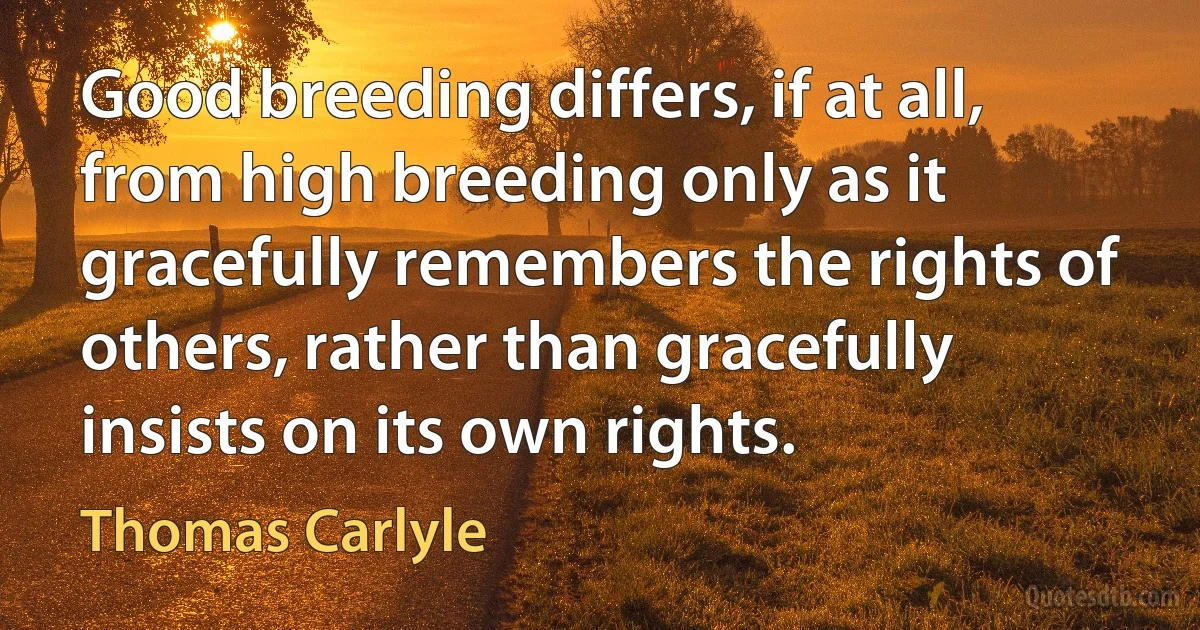Others Quotes - page 99
It is truly a lordly spectacle how this great soul takes in all kinds of men and objects, a Falstaff, an Othello, a Juliet, a Coriolanus; sets them all forth to us in their round completeness; loving, just, the equal brother of all. Novum Organum, and all the intellect you will find in Bacon, is of a quite secondary order; earthy, material, poor in comparison with this. Among modern men, one finds, in strictness, almost nothing of the same rank. Goethe alone, since the days of Shakspeare, reminds me of it. Of him too you say that he saw the object; you may say what he himself says of Shakspeare: 'His characters are like watches with dial-plates of transparent crystal; they show you the hour like others, and the inward mechanism also is all visible.

Thomas Carlyle
The seeing eye! It is this that discloses the inner harmony of things; what Nature meant, what musical idea Nature has wrapped up in these often rough embodiments. Something she did mean. To the seeing eye that something were discernible. Are they base, miserable things? You can laugh over them, you can weep over them; you can in some way or other genially relate yourself to them; - you can, at lowest, hold your peace about them, turn away your own and others' face from them, till the hour come for practically exterminating and extinguishing them!

Thomas Carlyle
There has been considerable comment over the awarding of the Nobel Peace Prize to a soldier. I am afraid this does not seem as remarkable to me as it quite evidently appears to others. I know a great deal of the horrors and tragedies of war. ... The cost of war in human lives is constantly spread before me, written neatly in many ledgers whose columns are gravestones. I am deeply moved to find some means or method of avoiding another calamity of war.

George C. Marshall
What I mean is that the idea of detached bodies floating in space, of different sizes and densities, perhaps of different colors and temperatures, and surrounded and interlarded with wisps of gaseous condition, and some at rest, while others move in peculiar manners, seems to me the ideal source of form.

Alexander Calder
There was only the choice between Communism and Hitler, and I will tell you why Hitler won. People will not give up religion, rights, freedom of personality, the opportunity to develop by individual effort - which includes private property. And the other reason for Hitler's winning is that if a whole people is treated as the Germans were, everyone will say, 'Are we worse people than others? Are we of a minor race?' Just as every single individual needs and must have self-respect, just as every family is proud of decent traditions, so every nation wants to maintain her individual manner, culture, language, and customs. It was in these respects that Communism failed. The Communists said that God was nonsense and stupidity and preached internationalism without maintaining the natural national feelings of a nation.

Hjalmar Schacht
Though I do, of course agree with the principles you have mentioned, I am returning the paper unsigned, as I do not want to belong to a group. A group of people with one aim is not as yet a single-minded group and as this does not exist, a consistent group remains impossible. And a larger group only makes sense for joint exhibitions and for spreading ideas. I will therefore not participate in the other group either, but I have promised my collaboration in this respect. If you definitely want to form a group, you can always invite myself and others who are proved to be suitable. Only on such a basis I will collaborate with the other group as well.

Piet Mondrian
I believe that it is possible by means of horizontal and vertical lines, constructed 'consciously' but not 'calculating', guided by a higher intuition and brought to harmony and rhythm – I believe that these fundamental aesthetic shapes – where necessary supplemented by lines in other directions or curved lines, make it possible to arrive at a work of art which is as strong as it is true. For anyone who sees more deeply, there is nothing vague about this; it is only vague for the superficial observer of nature. And 'chance' must be as far removed as 'calculation'. And for the rest it seems to me that it is necessary to keep breaking off the horizontal or vertical line: for if these directions were not countered by others, they would themselves come to signify something 'specific' and thus human.

Piet Mondrian
As far as they were concerned, gunfire was nothing but noise. That's why wars can keep going. Even the people who make them, who fight in them, don't really get the picture. Even with a bullet in their gut, they'd go on picking up old shoes that "might come in handy.” The way a sheep, lying on its side in a meadow, will keep on grazing with its dying breath. Most people don't die until the last moment; others start twenty years in advance, sometimes more. Those are the unfortunates.

Louis-Ferdinand Céline
In primitive society the rules of ceremonial purity observed by divine kings, chiefs, and priests agree in many respects with the rules observed by homicides, mourners, women in childbed, girls at puberty, hunters and fishermen, and so on. To us these various classes of persons appear to differ totally in character and condition; some of them we should call holy, others we might pronounce unclean and polluted. But the savage makes no such moral distinction between them; the conceptions of holiness and pollution are not yet differentiated in his mind. To him the common feature of all these persons is that they are dangerous and in danger, and the danger in which they stand and to which they expose others is what we should call spiritual or ghostly, and therefore imaginary. The danger, however, is not less real because it is imaginary; imagination acts upon man as really does gravitation, and may kill him as certainly as a dose of prussic acid.

James Frazer
If we can't or won't define the enemy, the cost to fight such a war will be endless. How many American troops are we prepared to lose? How much money are we prepared to spend? How many innocent civilians, in our nation and others, are we willing to see killed? How many American civilians will we jeopardize? How much of our civil liberties are we prepared to give up? How much prosperity will we sacrifice? [...] I support President Bush and voted for the authority and the money to carry out his responsibility to defend this country, but the degree of death and destruction and chances of escalation must be carefully taken into consideration.

Ron Paul
We have no constitutional authority to police the world or involve ourselves in nation building, in making the world safe for our style of democracy. Our founders advised against it and the early presidents followed that advice. If we believe strongly in our ideals, the best way to spread them is to set a good example so that others will voluntarily emulate us. Force will not work. Besides, we do not have the money.

Ron Paul
It is said we go about the world waging war to promote peace, and yet the price paid is rarely weighed against the failed efforts to make the world a better place. Justifying conscription to promote the cause of liberty is one of the most bizarre notions ever conceived by man! Forced servitude, with the risk of death and serious injury as a price to live free, makes no sense. What right does anyone have to sacrifice the lives of others for some cause of questionable value? Even if well motivated it can't justify using force on uninterested persons. It's said that the 18 year old owes it to his country. Hogwash! It just as easily could be argued that a 50 year-old chickenhawk, who promotes war and places the danger on innocent young people, owes a heck of a lot more to the country than the 18 year-old being denied his liberty for a cause that has no justification.

Ron Paul
Some of the strongest supporters of the war declare that we are a Christian nation, yet use their religious beliefs to justify the war. They claim it is our Christian duty to remake the Middle East and attack the Muslim infidels. Evidently I have been reading from a different Bible. I remember something about "Blessed are the peacemakers.” My beliefs aside, Christian teaching of nearly a thousand years reinforces the concept of "The Just war theory.” This Christian theory emphasizes six criteria needed to justify Christian participation in war... The war in Iraq fails to meet almost all of these requirements. This discrepancy has generated anger and division within the Christian community. Some are angry because the war is being fought out of Christian duty, yet does not have uniform support from all Christians. Others are angry because they see Christianity as a religion as peace and forgiveness, not war and annihilation of enemies.

Ron Paul
Etymologically, patient means sufferer. It is not suffering as such that is most deeply feared but suffering that degrades. That illness can be not an epic of suffering but the occasion of some kind of self-transcendence is affirmed by sentimental literature and, more convincingly, by case histories offered by doctor-writers. Some illnesses seem more apt than others for this kind of meditation.

Susan Sontag



